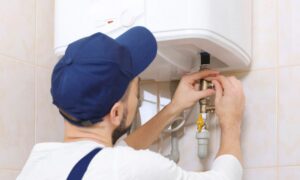Modern plumbing technology has undergone a significant transformation over the past few decades. Advancements in this field are not only designed to improve functionality but also aim to conserve water and energy, contributing towards a sustainable environment. Let’s explore the top 10 innovations that have revolutionized the plumbing industry.
- Smart Water Leak Detectors: These devices have become an important part of homes and businesses around the world. Equipped with advanced sensors, they provide real-time alerts about potential leaks or pipe bursts, helping prevent water damage.
- Tankless Water Heaters
- Water-Efficient Toilets: Using less than half of the water than standard models, these toilets provide substantial water savings.
- Smart Faucets: With features like touchless operation, temperature control, and automatic shutoffs, smart faucets help conserve water and reduce waste.
- High-Efficiency Showerheads: These showerheads use less water while providing a strong flow rate for a comfortable shower experience.
- Pex Piping: A flexible plastic piping system that is easier to install, resistant to scale and chlorine, reduces noise transmission and is freeze-resistant.
- Greywater Systems: Reuse of greywater (from washing machines or showers) for applications like flushing toilets or watering gardens can result in significant water savings.
- Water Softening Systems: These systems remove minerals from hard water that can cause buildup in pipes and appliances over time.
- Solar-Powered Hot Water Systems: By harnessing solar energy to heat water, these systems reduce reliance on non-renewable energy sources.
- Smart Irrigation Controllers:These controllers automate watering schedules based on weather conditions to optimize irrigation practices.
Integration of technology into plumbing systems has undoubtedly improved their efficiency and longevity. These innovations not only offer comfort and convenience but also contribute to significant water and energy savings. The future of modern plumbing promises more sophisticated technologies that will further enhance our day-to-day lives while promoting sustainability.
The field of plumbing is extensive and diverse, encompassing both commercial and residential services. Understanding the differences, similarities, and unique challenges associated with each sector can provide a more comprehensive view of the plumbing industry as a whole.
Residential Plumbing Services
Residential plumbing involves installing and repairing plumbing systems in homes and smaller buildings. These services are often more straightforward in nature but are crucial to maintaining comfortable living conditions.
- Repairing leaks: Leaky pipes or faucets are common household issues that need prompt attention to prevent water damage.
- Drain cleaning: A clogged drain can cause inconvenience by slowing down or stopping water flow.
- Water heater services: Regular maintenance or repair of water heaters ensures continuous supply of hot water.
- Toilet repair: Broken toilets need immediate attention to maintain sanitation and hygiene.
- Sewer line services: These involve inspecting, cleaning, repairing, or replacing sewer lines to prevent sewage backup.
Alexandria VA Plumber: Expert Commercial Plumbing Services
Commercial plumbing is typically more complex due to the larger scale of buildings such as office buildings, shopping malls, hospitals, or schools. The size and complexity of these systems require specialized knowledge and expertise.
- Backflow prevention: This service ensures that drinking water remains free from contamination.
- Grease trap cleaning: Restaurants and other food establishments require this service to prevent fats and oils from entering the sewage system.
- Hydronic heating: This involves maintenance or repair work related to heating systems that use water for heat transfer in large buildings.
- Industrial pump repair: Large commercial facilities often have pumping systems that need regular servicing or repairs.
Despite the differences in scale and complexity between residential and commercial plumbing services, both sectors demand high levels of skill, knowledge, precision, reliability, and customer service from professionals.
The Importance of Professional Plumbing in Alexandria VA
Whether it’s a minor clog in the home’s kitchen sink or a major leak in a commercial building’s sewage system, professional plumbing services play a vital role in maintaining the health and safety of our living and working environments. They ensure that water supply systems function optimally, waste disposal systems work efficiently, and heating systems operate effectively.
From repairing leaks to installing new fixtures to maintaining complex commercial systems, plumbing professionals use their skills and knowledge to solve problems, prevent damage, and keep our buildings functional. Moreover, they can provide valuable advice on matters such as water conservation and energy efficiency.
A deep understanding of the world of residential and commercial plumbing services enables us to appreciate the vital work that these professionals do behind the scenes every day. Their services ensure that we enjoy uninterrupted water supply, proper sanitation facilities, efficient heating systems, and more – all of which contribute significantly to our quality of life.
Greywater recycling systems are proving to be a groundbreaking development in the world of sustainable plumbing. As we grapple with water scarcity and climate change, the importance of efficient water usage becomes increasingly clear. Greywater recycling provides a solution to these challenges by reusing water from showers, sinks, washing machines and dishwashers that would otherwise go to waste.
Exploring Top Plumbing Companies in Alexandria VA
Greywater refers to domestic wastewater that has not been contaminated by any human or animal bodily waste. This differs from black water, which is wastewater from toilets that does contain such contaminants.
Typical sources of greywater include:
- Showers and bathtubs
- Washing machines
- Dishwashers
- Bathroom sinks
By contrast, black water comes from:
- Toilets
- Kitchen sinks and dishwashers (in some jurisdictions)
Plumbing Services in Alexandria VA: Your Guide to Greywater Recycling Systems
Greywater recycling systems collect, filter and treat greywater so it can be reused within the household or business premises.
- Collection: Greywater is collected from source appliances like showers, washing machines or bathroom sinks.
- Filtration: The collected greywater passes through a filter to remove large particles.
- Treatment: The filtered greywater goes through a treatment stage to remove remaining contaminants.
- Distribution: The treated greywater is then distributed for reuse.
The Importance of Plumbing Contractors in Alexandria VA for Sustainable Greywater Recycling
The potential benefits offered by greywater recycling systems make them highly valuable in sustainable plumbing strategies.
- Water Conservation:By repurposing grey water for things like flushing toilets or irrigating landscapes, you can significantly reduce your freshwater usage.
- Reduced Strain on Wastewater Treatment:When less wastewater goes into municipal sewage systems, it lessens the burden on these systems and helps to prevent sewage overflows.
- Energy Savings:Wastewater treatment plants require substantial energy to operate. Greywater recycling can reduce the need for this treatment, thereby conserving energy.
- Decreased Water Bills:As you start using less fresh water, your utility costs can decrease.
Challenges with Alexandria VA Plumbing Systems
Despite their numerous benefits, greywater recycling systems also come with challenges. These include the initial cost of installation, ongoing maintenance needs, and regulatory barriers in certain regions. However, as technology advances and awareness grows about the need for water conservation, it is likely that these challenges will be increasingly addressed.
The rise of sustainable plumbing practices such as greywater recycling is a testament to how innovation can help overcome environmental challenges. By reusing water that would otherwise be wasted, we can make strides towards preserving our most precious resource.

In this era of advanced technology, touchless plumbing fixtures have emerged as a significant innovation integrating hygiene and convenience. These smart gadgets, also known as hands-free or automatic fixtures, have provided a solution to the need for contactless interactions in various spheres of our daily life.
Touchless plumbing fixtures work based on sensors that activate water flow without the need for physical contact. Whether it’s a touchless faucet in your kitchen or an automatic toilet in your bathroom, these devices are designed to provide maximum convenience while minimizing the spread of germs.
Benefits of Touchless Plumbing Fixtures
There are several advantages to incorporating touchless plumbing fixtures into residential and commercial spaces:
- Improved Hygiene:As these fixtures eliminate the need for physical contact, they reduce the risk of germ transmission. This is particularly beneficial in public spaces where numerous people use the facilities.
- Water Conservation:Touchless faucets and toilets can efficiently manage water usage because they only dispense water when their sensors detect movement. This feature can significantly contribute to water conservation efforts.
- Ease of Use:These devices come with easy-to-follow instructions for installation and operation. They offer convenient use for individuals with mobility issues or children who struggle to reach manual faucets.
- Aesthetically Pleasing:Touchless plumbing fixtures often feature sleek and modern designs that can enhance the overall look of your bathroom or kitchen.
Types of Touchless Plumbing Fixtures
Below are some commonly used touchless plumbing fixtures:
- Touchless Faucets:These dispense water once they detect hand motion underneath them. They’re mainly used in kitchens and bathrooms.
- Automatic Toilets:Equipped with automatic flush systems that sense when to flush, thus preventing germ spread from touching handles.
- Automatic Soap Dispensers:These release a set amount of soap when hands are placed underneath, minimizing wastage and promoting cleanliness.
- Touchless Showers:Much like the faucets, these activate upon detecting movement and are particularly beneficial in public shower rooms.
A Step Towards a Sustainable Future
Touchless plumbing fixtures contribute significantly towards creating a sustainable future. With their focus on water conservation, they help to curtail excessive water usage. By minimizing contact with surfaces, they also play a significant role in promoting better hygiene habits within society.
As technology continues to evolve, we can expect touchless plumbing fixtures to become more widespread and even more efficient. They represent a fusion of ingenuity and practicality – addressing both the increasing demand for hygiene in public spaces and the urgent need for water conservation. The future of plumbing is indeed looking brighter with these innovative solutions.
In the vast realm of plumbing, several myths have become common knowledge. These myths often lead homeowners to make decisions that could potentially damage their plumbing system or waste significant amounts of water. Understanding the truth behind these misconceptions is crucial in maintaining your home’s plumbing health. Let’s debunk some of these popular plumbing myths.
Myth 1: Lemons Clean Your Garbage Disposal
Many people believe that running a lemon rind through the garbage disposal cleans it, leaving a fresh citrus scent. While it may leave your kitchen smelling lemony fresh, it does not effectively clean your garbage disposal. The acidity in lemons can actually corrode the metal components in your disposal. Instead, opt for a mixture of mild soap and warm water for an effective clean-up.
Myth 2: Running Water While Using the Garbage Disposal Helps Waste Travel
While running water does help waste travel smoother, it cannot break down everything you toss into the disposal. Hard or stringy food items like bones or celery can potentially cause damage to your system regardless of how much water you use.
Myth 3: Plumbing Systems Require Little to No Maintenance
Just like any other home system, regular maintenance is essential for an efficient and long-lasting plumbing system. Regular check-ups prevent minor issues from becoming major problems that could result in costly repairs.
Myth 4: All Plumbers Are Created Equal
Not all plumbers have the same level of training or experience. Certified professional plumbers undergo extensive training and have years of experience tackling various plumbing issues.
Myth 5: Chemical Drain Cleaners Are Perfect For Unclogging Drains
Contrary to popular belief, chemical drain cleaners should be avoided if possible as they can cause harm to your pipes and are bad for the environment. They may provide a quick fix, but the harsh chemicals can slowly damage your pipes over time. Using a plunger or a plumber’s snake is a safer method.
Myth 6: Plumbing Fixtures Don’t Save That Much Water
Modern plumbing fixtures such as low-flow toilets and showerheads can significantly reduce your water usage, leading to lower utility bills and a smaller environmental footprint.
Let this guide debunk the common plumbing myths and lead you to make informed decisions regarding your home’s plumbing system. Remember, when in doubt, consult with a professional plumber to prevent unnecessary damage or costly repairs.
